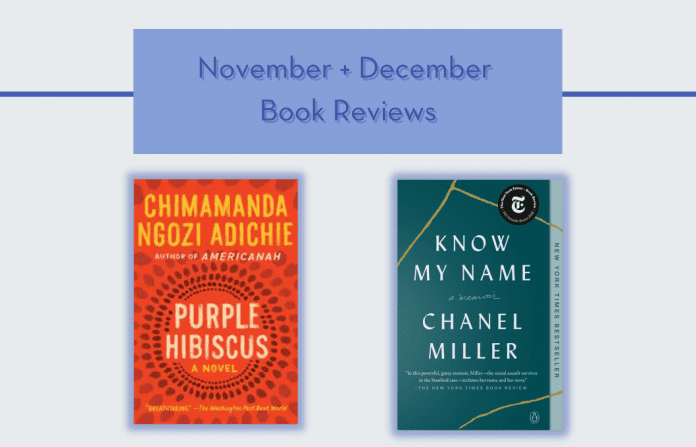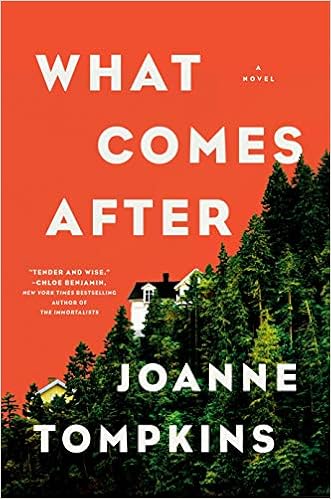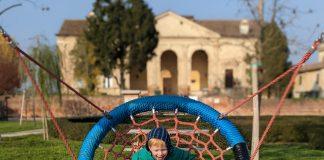
November and December got away from us at the MMC Book Club (as it does for many of us). So this month, we are delivering both of our book reviews from those months. Enjoy!
November Book: Purple Hibiscus
{trigger warning: physical and verbal abuse}
If you have ever read a book by Chimamanda Ngozi Adichie, you know that her stories have a way of drawing you in while learning more about Nigeria and African history, culture, and customs. Her first published book, Purple Hibiscus, takes us through this and behind the curtain of a well-to-do family in Nigeria.
 We meet Kambili, our fifteen year old narrator living with her brother Jaja and parents in Enugu. They are a wealthy, religious family living in a walled compound and attending private schools. There is plenty of food and clothing; they have attendants and drivers; they even own a second compound in their home village of Abba. Her father is a pious man who bestows generosity on his employees, church congregants, and villagers in Abba.
We meet Kambili, our fifteen year old narrator living with her brother Jaja and parents in Enugu. They are a wealthy, religious family living in a walled compound and attending private schools. There is plenty of food and clothing; they have attendants and drivers; they even own a second compound in their home village of Abba. Her father is a pious man who bestows generosity on his employees, church congregants, and villagers in Abba.
But inside their home, her father is a completely different.
Papa is verbally and physically abusive to both the children and his wife. He demands perfection and absolute religious devotion from his family, going so far as to shun his own father for not believing in God. When they are not able to meet his rigorous demands, he abuses them. When his wife and Kambili’s mother is pregnant and feeling weak after Pentecost Sunday, she asks to remain in the car while the rest of the family visits the priest. Papa is angry and beats her so severely at home that she miscarries the baby. This is just one example of this treatment that is never discussed and hidden from the outside world.
Nigeria is changing, and Kambili and Jaja’s lives are, too.
There is a military coup, and a coworker of Papa’s is thrown in jail. He allows the children to visit their Auntie Ifeoma in Nsukka to get away from the tension. It is there that they witness what a different life they could lead. Their aunt and cousins live in a small flat with spotty water and electric service, and their lives are much more frugal. Yet they are happy. The children are free to speak and voice opinions; they can study and play without fear or a schedule to follow; there is love and joy despite the financial strains on the household.
It begs to ask an age-old question: does money truly equate to happiness?
Kambili and Jaja want for nothing in their family. There is never a worry about food or shelter, and they receive the best of everything. But you watch as they grow to appreciate the freedom of a happy home over having things, a life lived in love over fear.
What happens to Kambili and her family is told in the rest of this beautiful book of family, growing up, and relationships. We loved this book (but we love all Adichie’s books) and would love to hear what you thought of it as well!
December Book: Know My Name
{trigger warning: sexual assault}
She was known as Emily Doe, the victim of the 2015 Stanford rape that made national headlines.
You might remember the pictures of Brock Turner, the perpetrator. You might recall hearing about his academic achievements, his accomplishments as a future Olympic swimmer, or how this event was ruining his life. But how much did you hear about the victim?
This is her story, and her name is Chanel Miller. She tells her story in Know My Name.
 Miller was a twenty-two year old woman who had lived near Stanford her whole life. She was attending a party at a fraternity on the Stanford campus with her younger sister (home from college for the weekend) and her friends. She was a shy, recent graduate herself and despite feeling silly attending a college party, Miller simply wanted to spend time with sister and have a few drinks with friends. Nothing unusual, right?
Miller was a twenty-two year old woman who had lived near Stanford her whole life. She was attending a party at a fraternity on the Stanford campus with her younger sister (home from college for the weekend) and her friends. She was a shy, recent graduate herself and despite feeling silly attending a college party, Miller simply wanted to spend time with sister and have a few drinks with friends. Nothing unusual, right?
But there was nothing usual about that night, as we learn.
Miller remembers waking up in an exam room, feeling sore and greeted by people she did not know. She was told that she had been assaulted and was found by some bystanders as it happened. As she pulled dozens of pine needles from her hair and endured a rape examination, she tried to recall what had happened and how to process it.
The book takes a deep dive into the trauma and aftermath of sexual assault from a survivor’s experience.
There are so many things we learned from Chanel Miller. We assume by watching TV or crime reporting that rape kits are processed in a timely manner, yet we learn that it can take months and years for this to happen. We knew that it was distressing and troubling to prepare for trial and to tell your story, but she gives us a firsthand look at how long the process is, how invasive it is, and the way it forces victims to account for and defend so much of their lives (even beyond the assault).
Finally, we saw that the trauma of this attack can take years and years to accommodate and process. It is a horrible, brutal crime that never goes away, and survivors everywhere are challenged to continue living their lives while irreparably changed.
This is heavy and necessary read. We applaud Chanel Miller for taking back her name, writing about her experience, and exposing so much of this entire ordeal and attack from start to finish to hopefully help others understand.



 Thank you for reading with us through the end of 2021! This month, we are reading
Thank you for reading with us through the end of 2021! This month, we are reading 







